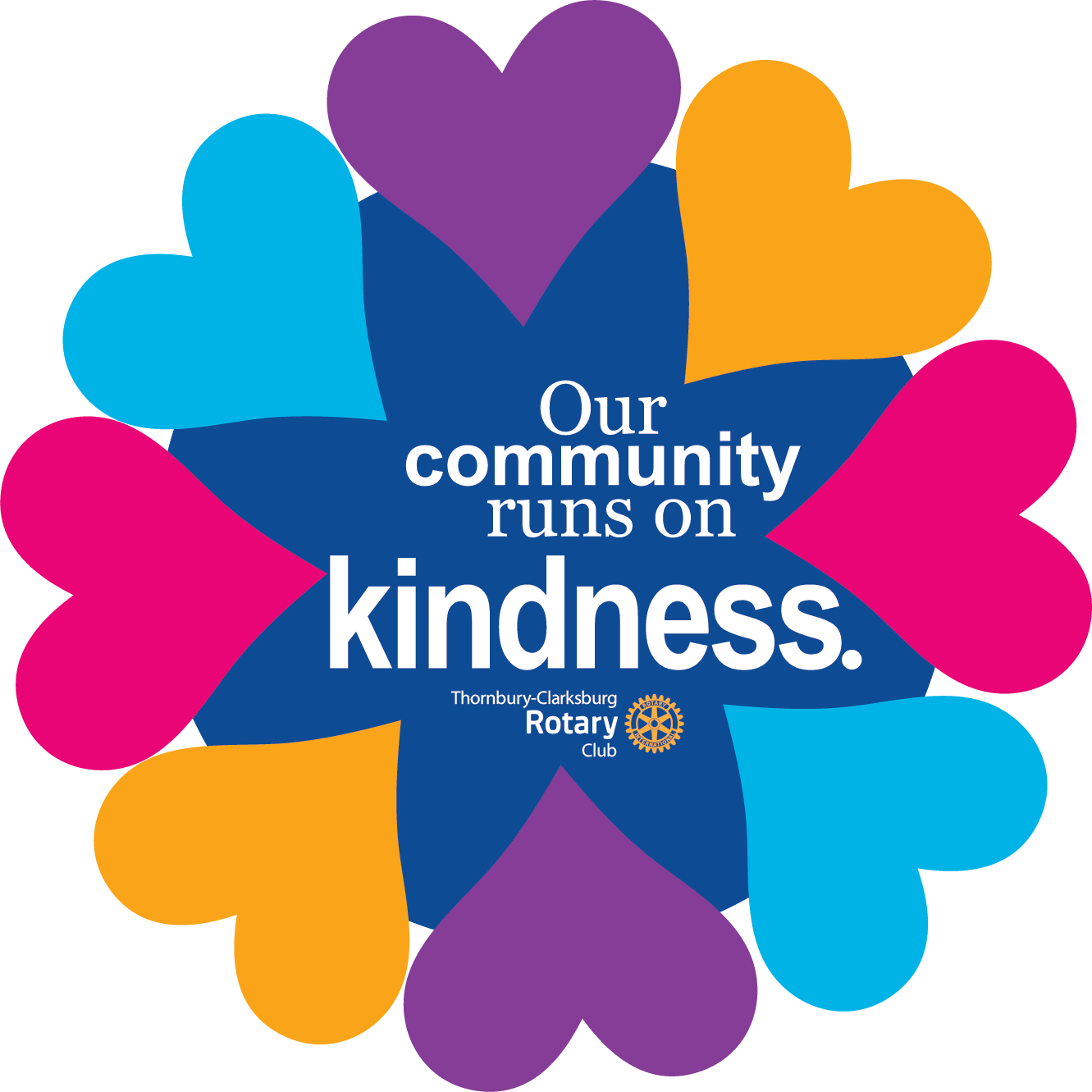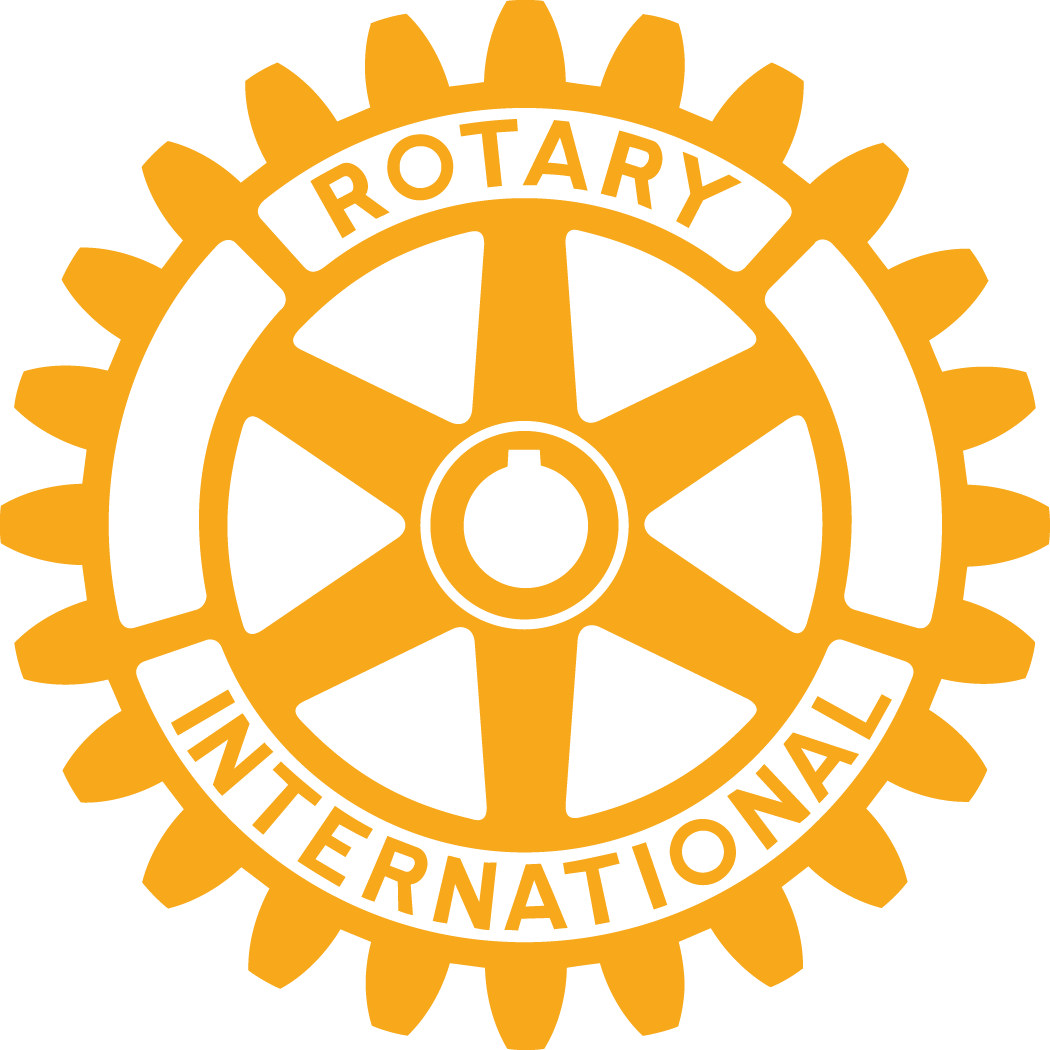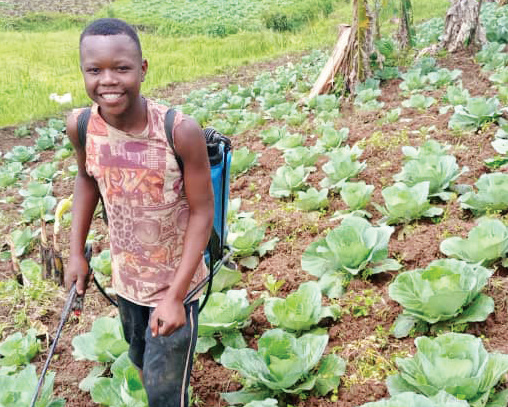 The Elgon Ngoma Troupe, located in Mbale Uganda is a small community-based home for former street kids and orphans. T-C Rotary has been assisting them to become more self-sustaining, with the help of the Mbale Metropolitan Rotary Club (MMR). Several projects over the past two years have resulted in the rehabilitation of an abandoned farmhouse on a donated two acre farm in the nearby village of Mawululu on the lower slope of Mt Elgon. As well, there are now male and female latrines and showers, a rainwater catchment system, and a new kitchen and storage room. These projects have resulted in Elgon Ngoma Troupe's ability to farm the land and significatnly reduce their food insecurity as well as address overcrowding in their Mbale town rented home. But that's not all...these projects are having an amazing ripple effect on the youth and also on villagers in one of the poorest areas of Uganda.
The Elgon Ngoma Troupe, located in Mbale Uganda is a small community-based home for former street kids and orphans. T-C Rotary has been assisting them to become more self-sustaining, with the help of the Mbale Metropolitan Rotary Club (MMR). Several projects over the past two years have resulted in the rehabilitation of an abandoned farmhouse on a donated two acre farm in the nearby village of Mawululu on the lower slope of Mt Elgon. As well, there are now male and female latrines and showers, a rainwater catchment system, and a new kitchen and storage room. These projects have resulted in Elgon Ngoma Troupe's ability to farm the land and significatnly reduce their food insecurity as well as address overcrowding in their Mbale town rented home. But that's not all...these projects are having an amazing ripple effect on the youth and also on villagers in one of the poorest areas of Uganda. 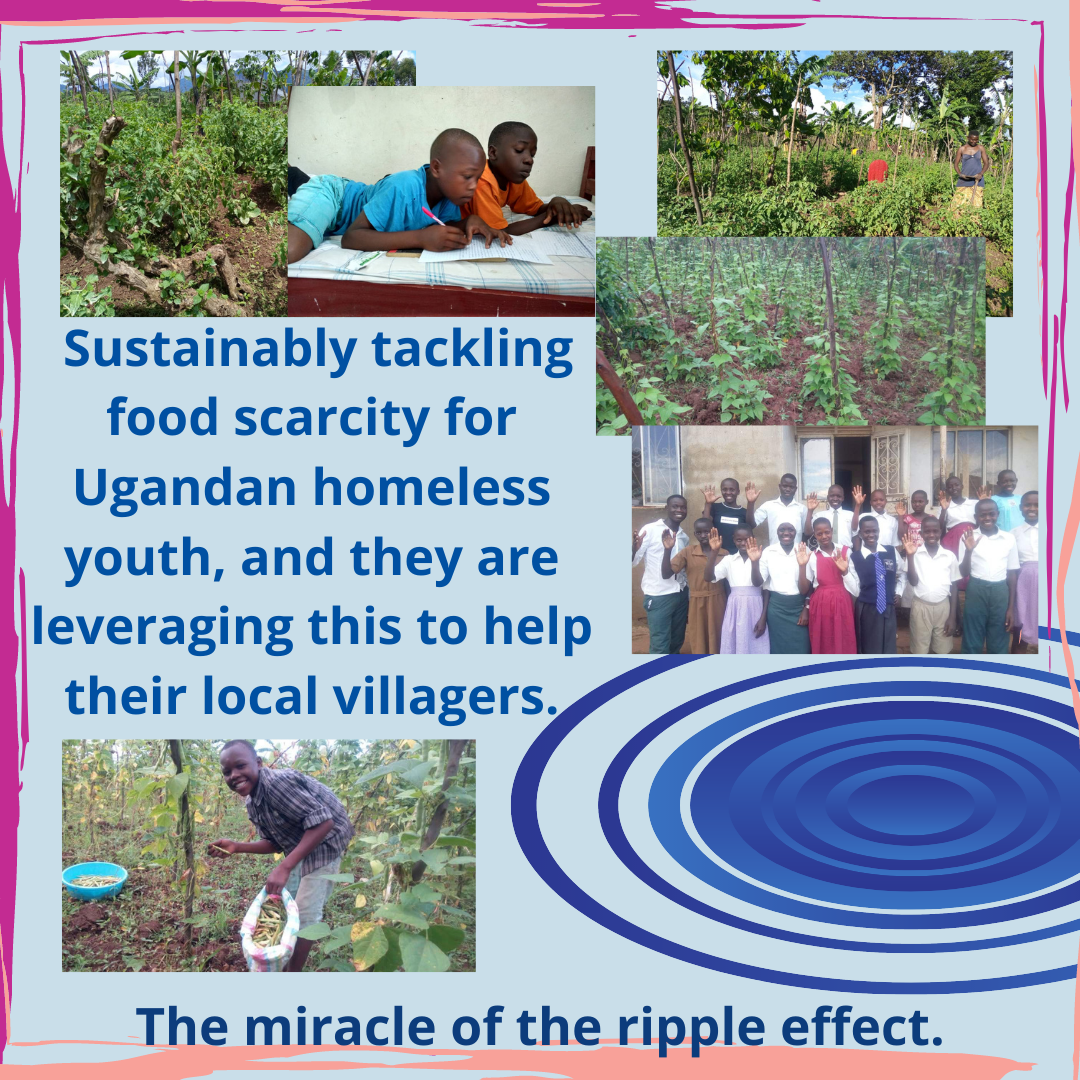
Inspiration in the face of challenges
In 2019, Palma Barbieri, one of our members, attended the Rotary International Convention in Hamburg. Post convention, Palma planned to head to East Africa for a 6-week backpacking trip with her daughter Ally. At the convention, Palma met Julius Wolimbwa, a young Rotarian from Mbale Uganda. He offered to host them for their 2-day trek off the beaten path to beautiful Sipi Falls. When Palma and Ally arrived in Mbale they attended a Rotary meeting with the Mbale Metropolitan (MMR) club and spent time with Julius and the Elgon Ngoma Troupe.
The Elgon Ngoma Troupe is a community-based non-profit founded by Julius just over 10 years ago. The aim is to help children and youth living or being exploited in the streets of the region by getting them off the streets, back into school and discovering and developing their potential in traditional African music and dance.
Over the past 10 years, Elgon Ngoma Troupe has helped about 100 youth to improve their potential for self-sustaining futures. Julius has dedicated his life to helping youth in the region, knowing as he does the life of a street kid - hunger, homelessness, no education, risk of exploitation and child trafficking - because he was an orphan himself at age nine. His musical talent, intelligence and the help of some caring teachers helped him to create a better life for himself and now for other street kids.
The Troupe rents a small house for some of the youth and Julius works to reunite others with their families where possible. Maximum capacity is 12 but since Covid-19 hit up to 25 youth aged 10 to 16 years old have shared beds. Julius ensures a family atmosphere and respectful environment for the Troupe members while instilling self-confidence, self-esteem and pride. The Troupe’s paid performances provide some of the funds needed to shelter, feed and educate its members. Former members who have ‘graduated’ from the Troupe volunteer as mentors, trainers and supervisors for the current youth and provide some administrative support.
The challenges
Mbale region lies just south of a region where ethnic strife between 1990-2010 caused much devastation, including an AIDS empidemic. In 2018 the government estimated the number of children and youth living, or being exploited, on the streets to be 15,000 nationwide – 4,000 of whom are in Mbale district. No government programs exist and so non-profits like Elgon Ngoma try to fill the void.
Raising funds for the basic survival needs of the Troupe is an insurmountable challenge. T-C Rotary provided $750 in January 2020 for the term’s school fees and supplies for two of the young girls living at the Elgon Ngoma Troupe home. Then Covid-19 happened. The resulting lockdown restrictions closed all schools in mid-March and prevented the Troupe from performing. With no income, the Troupe was unable to pay rent or buy food beyond some small donations. Seeing this dire situation, T-C Rotary contributed $750 a month to fund food purchases for 4 months from May to August.
Uganda’s government maintained very tight Covid-19 restrictions, prolonging the lockdown and causing severe economic impacts in a part of the country that was already poor, making it harder to raise funds for food and rent. So, how can we help in a more sustainable way? ...Help them start a farm…and they will have food for a lifetime
Our Support and the Ripple Effect
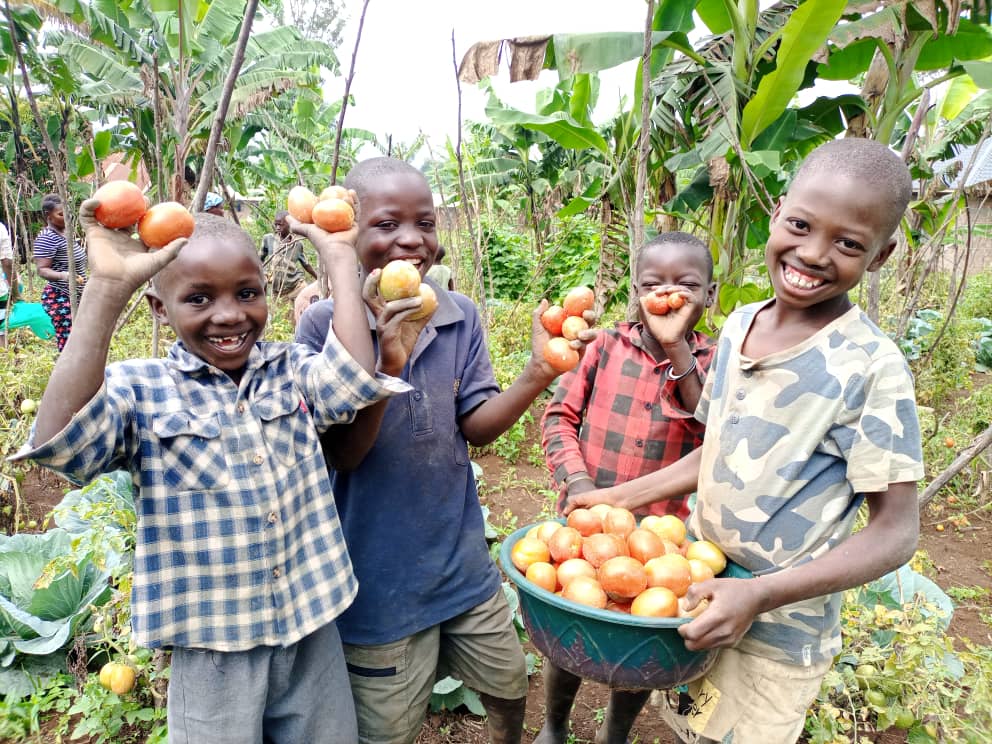 Prior to Covid-19, Julius had been exploring ideas for developing additional self-funding activities but they all required an initial investment that Elgon Ngoma could not raise while still ensuring the children had their basic needs looked after. Then in the summer of 2020, Julius approached T-C Rotary with a proposal to rehabilitate a small village farm that would provide additional housing and also 35% - 50% of the Troupe’s food needs once it had matured. The project would also help some youth learn farming skills and older youth would have paid work. Julius could provide an abandoned 2-acre farm with a dilapidated farmhouse in Mawululu, a village about an hour north of Mbale at no cost. What he required was funding for repairs to the farmhouse to alleviate the unhealthy crowding situation at the Mbale home and to provide farm tools and seed to start growing vegetables and staples like beans and corn.
Prior to Covid-19, Julius had been exploring ideas for developing additional self-funding activities but they all required an initial investment that Elgon Ngoma could not raise while still ensuring the children had their basic needs looked after. Then in the summer of 2020, Julius approached T-C Rotary with a proposal to rehabilitate a small village farm that would provide additional housing and also 35% - 50% of the Troupe’s food needs once it had matured. The project would also help some youth learn farming skills and older youth would have paid work. Julius could provide an abandoned 2-acre farm with a dilapidated farmhouse in Mawululu, a village about an hour north of Mbale at no cost. What he required was funding for repairs to the farmhouse to alleviate the unhealthy crowding situation at the Mbale home and to provide farm tools and seed to start growing vegetables and staples like beans and corn.With a sizable amount of its international funds unallocated, T-C Rotary decided this was a project worthy of our support. The help of the MMR club, where Julius is a member, was crucial. They have an engineer and other relevant experts on their roster. They provided a detailed assessment of the needs and costs for the basic structural rehabilitation. A $10,000 commitment for the project (along with a small donation from the MMR) provided enough funds for an access drive from the village road, much needed structural repairs and new roof to the farmhouse, as well as the purchase of tools and some crop seeds and 110 banana and plantain saplings for the farm. By Fall 2020, the planting had started and in early 2021, there was a large crop of climbing beans ready to harvest. Some of the harvest was shared with the 6 village families who helped with the farming, some was sold, some was food for the youth at Elgon Ngoma, and some was held back as seed for future planting. A garden of tomatoes and cabbage followed in the next planting season, and then a cabbage only planting season.The basic structural rehabilitation work on the farmhouse was complete by early 2021 but there was still painting, doors and other interior work that needed to be funded. And the farm had a single very old latrine outdoors and no shower or water or electricity. In addition, the kitchen was an outdoor cooking area with a flimsy metal cover. Irrigation water comes from a small creek that runs through the edge of the farm and there is village well that goes dry during dry season from which the youth can fetch water for cooking.
In spring 2021, MMR and Elgon Ngoma presented two proposals: one for completing the farmhouse interior at a cost of $5,000 and the other for building male and female latrine and showers, a water catchment system with a 10,000 L storage tank, and a new kichen roof for $8,000. We agreed to fund the two projects and we were able to obtain a Rotary District grant for $2,500 towards the cost of the second project. Work commenced in July 2021.
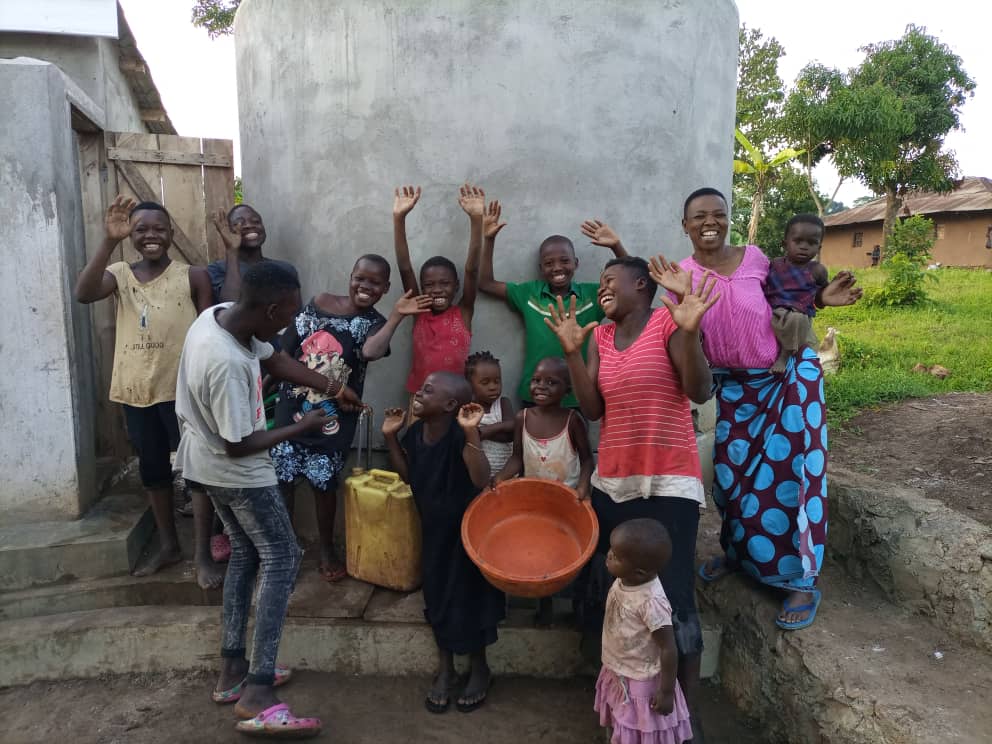 The rainwater catchment system was ready in time for the Fall 2021 rainy season, and brought much needed clean water during dry season for the troupe, the farm, and half the village residents. Luckily, just as the storage tank ran out of water, the rains arrived in late March! Someone was smiling down on all of us. With a generous additional donation of materials and labour from the MMR club – the outdoor kitchen became a proper closed-in kitchen with a food storage area, and they built the first energy-saving stove in the village. The stove uses significantly less wood and produces very little polluting and health damaging smoke.
The rainwater catchment system was ready in time for the Fall 2021 rainy season, and brought much needed clean water during dry season for the troupe, the farm, and half the village residents. Luckily, just as the storage tank ran out of water, the rains arrived in late March! Someone was smiling down on all of us. With a generous additional donation of materials and labour from the MMR club – the outdoor kitchen became a proper closed-in kitchen with a food storage area, and they built the first energy-saving stove in the village. The stove uses significantly less wood and produces very little polluting and health damaging smoke.The farm is continuing to produce a variety of vegetables with the current (4th) growing season focused on beans and maize. They have planted 50 kg of bean seeds and 20 kg of maize seeds on 1.5 acres of land. The other half acre has been assigned to village families who are helping with the farm so they can grow their own crops rather than sharing in the Elgon Ngoma's crops. In addition, the 110 green banana and plantain trees that were planted are also now providing much needed food. Over the past 2 years, the Covid-19 local travel restrictions required Elgon Ngoma to rely almost entirely on local villagers to help tend and harvest the crop in exchange for a share of the harvest. This has been a boon to residents of Mawululu village where there are very high rates of poverty.
Additionally, because Mawululu is in an area where significant deforestation has lead to erosion – Elgon Ngoma and the MMR club have noted the potential to share farm productivity and energy-efficient stove technology with the villagers to gradually help them build a more sustainable life. We will be exploring whether there is a role for T-C Rotary and our community to play in this.
We are grateful to our friends at the MMR club for partnering with us in this effort. They provided the vital on-the-ground supervision and support to make this project a success for the Troupe.
